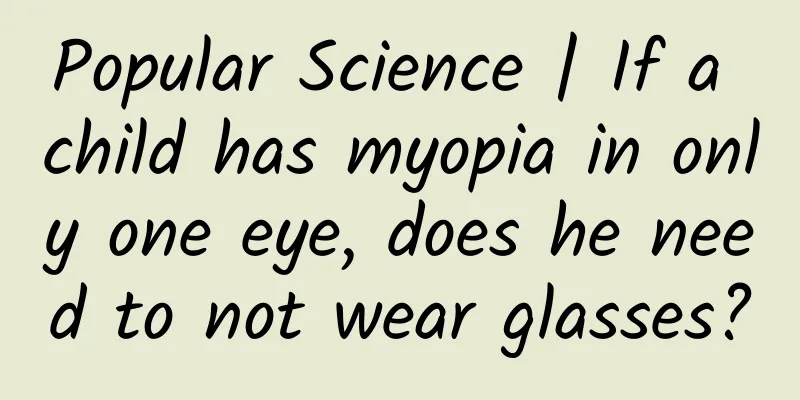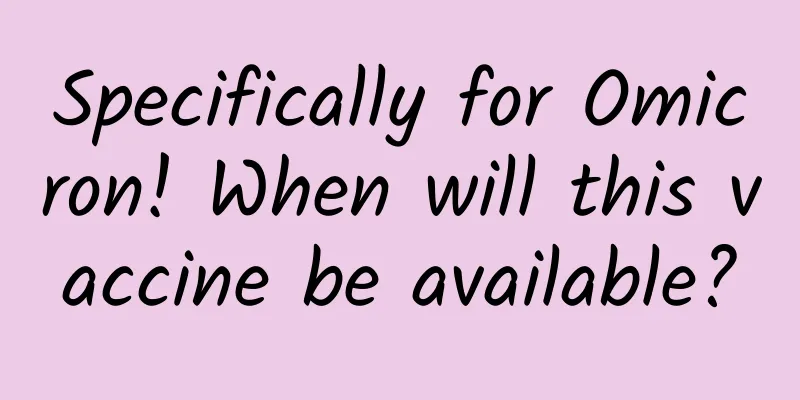Popular Science | If a child has myopia in only one eye, does he need to not wear glasses?

|
"My child has normal vision in one eye and myopia in the other eye, but he says he can see the blackboard clearly. Does he need to wear glasses?" I believe many parents have this doubt. Here, the editor directly announces the answer: NO! You must wear glasses to correct your vision !!! What is anisometropia? Why do the degrees of myopia or astigmatism in the two eyes differ when we see things with both eyes? In fact, during the development of our eyes, there are certain differences in the refractive state of most people's eyes . What's more, one eye may be myopic and the other may not be myopic. In ophthalmology, the phenomenon of "inconsistent refractive state of the two eyes" is called anisometropia . In fact, most myopic people have more or less anisometropia, but most of them have little difference in the degree of binocular vision, no obvious symptoms, and no impact on eye health. It is physiological anisometropia. However, when the difference in the amount of anisometropia is 250 degrees, it is considered pathological anisometropia and must be paid attention to. Usually, our two eyes work together, not separately. Just like walking on two legs, if one leg is longer than the other, you may walk with a limp. A large difference in degree will also make it difficult for the binocular fusion to cause many problems. What effects does anisometropia have on the eyes? 1. More prone to visual fatigue The large difference in the degree of vision between the two eyes can easily lead to consequences such as visual fatigue, dry eyes, tearing, headache, nausea, dizziness, etc., and there may be deviations in judging distances and angles. 2. The poor eye's vision declines faster There is a principle when using eyes - "use it or lose it", that is, the good eye should be used frequently, and the bad eye should be gradually stopped from being used. In this way, the eye with poor vision will experience a phenomenon of myopia increasing rapidly and vision decreasing rapidly. 3. Can cause monocular amblyopia When a child has anisometropia in both eyes, the eye with smaller refractive power can see things more clearly, while the eye with larger refractive power cannot see things clearly, and the brain cannot fuse the two images with different clarity into one. At this time, the brain will command the eye with smaller refractive power to work, and inhibit the eye with larger refractive power from working. Over time, the eye with larger refractive power will develop into amblyopia . 4. Can cause monocular strabismus When the brain cannot fuse two images of different clarity into one, it actively suppresses the visual development of the eye with poorer vision . If one eye is "blind" for a long time, the child may lose stereoscopic vision. If effective treatment is not carried out, the poorer eye may develop strabismus over time. What should I do if I have anisometropia? The most common and simple way to correct anisometropia is to fit glasses . Children have greater adaptability and plasticity, and can accept frame glasses better. If the difference in the degree of the two eyes is too large, the size of the frame glasses image cannot be integrated in the brain, and the patient will not tolerate the frame glasses. At this time, you can consider using orthokeratology lenses (OK lenses) to correct it. Orthokeratology lenses are contact lenses, which are worn on the surface of the cornea. Therefore, the size of their images is close to that of emmetropia, and no prism effect will be produced when the eyeballs rotate. Therefore, orthokeratology lenses can correct medium and high refractive anisometropia. In addition, for children with anisometropia , binocular visual function training and occlusion therapy are generally required to prevent the development of strabismus and amblyopia. Aier Eye Hospital reminds : Parents should take their children to professional ophthalmic medical institutions for vision examinations regularly and establish refractive development files as early as possible, so as to achieve early detection, early prevention, and early treatment of possible eye health problems in the future, so that children can spend a healthy and happy childhood. |
<<: Understanding Osteoporosis
>>: Prevent drowning, travel safely
Recommend
Extracorporeal shock wave lithotripsy is not a panacea—these patients must be selected carefully!
Author: Mao Yuanshen, attending physician of the ...
The benefits and taboos of hot spring bathing, be sure to read it!
Because the weather is cold and dry in autumn and...
Female uterus diagram
The Creator created "women" and gave th...
What do pregnant women need to supplement every month?
Everyone knows that pregnant women must have suff...
Which type of lotus root is easier to cook? How to cook lotus root to make it easier to cook
We all know that lotus root is a popular food. It...
Women's three meals a day weight gain recipes
What are the good three meals a day to gain weigh...
Causes of calf pain during pregnancy
We all know that women will experience swollen ca...
Does eating red meat prevent dementia? Does eating chicken cause acid reflux? How to eat meat healthily
In cold seasons, people tend to eat more meat, es...
Sprout Social: UK Social Media Index 2025 Report
199IT original compilation Social media is at the...
What are the most effective ways to enlarge breasts after childbirth?
Women cannot choose breast enhancement methods ra...
Pictures of cervical erosion after surgery
If cervical erosion develops to a mild or moderat...
How many times a week is best for women over 50?
Sexual life is one of the intimate activities bet...
What to do if pregnant women have prickly heat on their belly
During pregnancy, women will reduce their amount ...
Common complications and countermeasures in radiation care
Radiation care is a common cancer treatment metho...









